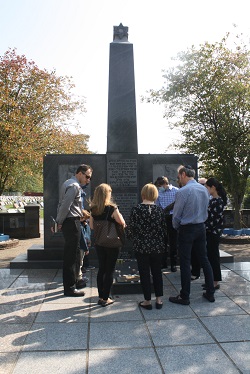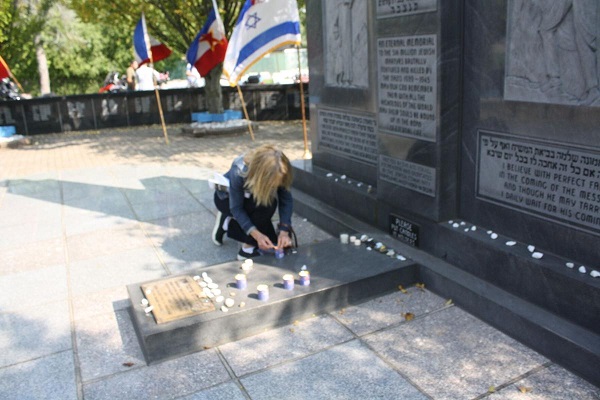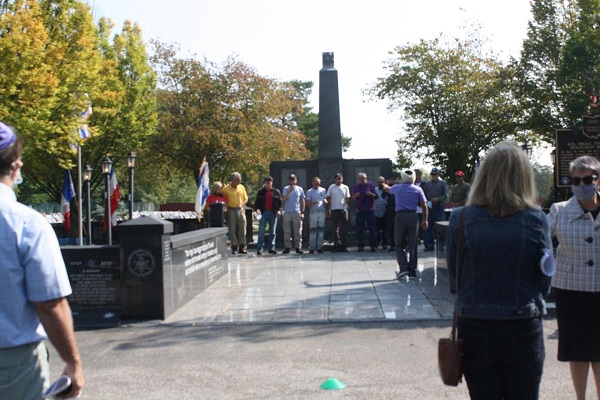09/29/2020
Nontraditional Fall Memorial Keeps Alive Holocaust Victims
- Share This Story
Because of your support, the Federation is able to keep the memory of the Holocaust alive through commemorations like our annual Kol Israel Fall Memorial.

Small groups of people gathered to pay respects to victims of the Holocaust at the Kol Israel Foundation's 19th annual Fall Memorial at the Cleveland Holocaust Memorial Monument in Zion Memorial Park in Bedford. CJN Photo / Jane Kaufman
Article reprinted with permission from Cleveland Jewish News
by JANE KAUFMAN | STAFF REPORTER
Small groups and individuals approached the Kol Israel Foundation Memorial at Mount Zion Cemetery in Bedford Heights on Sept. 27 for the 19th annual Fall Memorial, taking turns paying respect to their ancestors who were victims of the Holocaust.
Many of the 151 people who came to take part in the tradition of Kever Avot, visiting graves of loved ones between Rosh Hashanah and Yom Kippur, then went to the surrounding cemetery to candles and flowers at the graves of their parents and others, who survived the Holocaust and lived in Greater Cleveland.
The memorial, the oldest in the country, contains ashes of victims from three concentration camps.
Gordon Blimbaum arrived by motorcycle with the group Shul Boys, who in recent years made the pilgrimage on motorcycles to pay their respects.
Blimbaum is the son of the late Ber and Antonia Blimbaum, who ran the Time Out Restaurant at the Cleveland Arena in the 1960s. His parents belonged to Kol Israel Foundation.
He and his wife, Anita Solomon Blimbaum, visted her parents’ graves as well.

Loree Potash pays her respects at the Kol Israel Foundation and Jewish Federation of Cleveland's annual fall memorial Sept. 27 at the Cleveland Holocaust Memorial Monument at Zion Memorial Park in Bedford. CJN Photos / Jane Kaufman
“They were devoted parents and they loved to take care of their family,” Gordon Blimbaum said. “That was probably the most precious thing to them.”
Blimbaum’s parents met in Poland after World War II. His father was sent to Siberia and his mother escaped during a transfer from one concentration camp to another.
“She was quite a lady,” Anita Blimbaum said of her mother-in-law, who also cooked at Corky & Lenny’s for 35 years. “She was a very good cook of all the ethnic foods.”
In most years at this event, Charles Gruenspan would sing the memorial prayer, “El Malei Rachamim.”
This year, because of COVID-19, there was no formal ceremony. Instead, his voice could be heard singing the song through a recording.
Gruenspan was born in Landsberg, Germany, in a displaced persons camp, where his parents met and married within six weeks.
His father, Abraham Gruenspan, served in the Polish Army, was captured by the Soviets and then served in the Soviet Army. His mother, then named Tova Wieder, was smuggled by righteous gentiles to Switzerland during the war.
Gruenspan said he visits the memorial for the annual Fall Memorial out of “respect for my parents, respect for the grandparents, aunts and uncles that I never knew. Their names are on the walls here. Of course, I think that’s how the Jewish people have survived for thousands of years, because they do revere their history, their parents and their relatives.”
His wife, Linda Gruenspan, is a vice president of Kol Israel Foundation.

Small groups of people gather at the Cleveland Holocaust Memorial Monument in Zion Memorial Park in Bedford Sept. 27. Here the Shul Boys, a Jewish group of motorcyclists have their photo taken by Avi Goldman. CJN Photos / Jane Kaufman
“I’ve met so many of the survivors,” she said. “I’ve heard their stories. They’ve become friends of mine, dear friends, and it’s such a miracle that they made a life for themselves after all they went through.”
Sylvia Malcmacher Kramer came to pay respects to her father, Morry Malcmacher, a founding member of Kol Israel Foundation, for whom the monument was a passion.
“When Kol Israel was formed, one of the first functions that they needed to do was to find a place to go to between Rosh Hashanah and Yom Kippur to remember those that they lost in the Holocaust,” she said. “In addition to building the monument, the names reflected on the back of the monument were those that they wanted to remember. My grandfather’s name for which my brother Louis is named, is inscribed there, and much of my mother’s family and my aunt’s family.”
Michael Hennenberg came to the monument to remember his parents and ancestors. His father, Jacob Hennenberg, was Kol Israel Foundation’s historian.
“I knew that when he was in those death camps, the thing that angered him more than anything was that he would disappear and no one would know what happened to him,” Hennenberg said.
His father traded his prized blanket to have his photo taken and sent to family – family he later learned had perished during the Holocaust.
“My dad’s vision was that every name of every person who was lost and every person who survived and later was lost that their names should live on for all time,” Hennenberg said. “And dad spent hundreds and hundreds of hours working with families, posting the names.”
Henneberg said the monument is covered in names because so many survivors felt the same way his father did.
“They didn’t know where the grave was,” he said. “They didn’t know what happened to them, they just knew that they were a family and one day they were gone.”
Hennenberg was waiting for other family members to arrive, but he spent some time alone at his parents’ graves beforehand.
“I let them know how much I love them and miss them,” he said, adding that he tries to emulate his parents, “only caring about their family, not caring about anything else.”
“I definitely had a vision that we should do something in person,” said Josh Kramer, son of Sylvia Malcmacher Kramer and a vice president of Kol Israel Foundation, which held the event in concert with the Jewish Federation of Cleveland in Beachwood. “I think that being able to come together in person and pay our respects at the monument is really meaningful for people even though we’re not congregating and having a formal program. People are waiting and having a quiet moment to themselves in the circle of the boundaries of the monument. I think it’s healthy for people to come and honor their ancestors here.”
Trevor Joseph of Solon came with his twin boys, Liam and Evan, 5½, and met several family members at the monument. They were there to remember Joseph’s grandparents, Leo and Paula Silberman. Leo Silberman was a past president of Kol Israel Foundation.
“It’s nice that at least our whole family can come and be together to honor everybody,” Joseph said. “But it’s obviously a little bit strange not having a ceremony.”
Sherry Smith, Joseph’s aunt, said the lack of a formal ceremony may actually have encouraged more people to come.
“The idea is to just visit the grave during, between Rosh Hashanah and Yom Kippur, and this is the grave for a lot of our relatives that were killed during the war,” Smith said. “I mean these kids (the twins) wouldn’t be here for the regular ceremony, it’s too long. It’s a nice introduction for them to know their history and legacy.”

